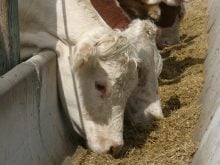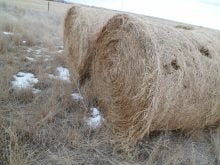Alberta’s general election is underway and it’s expected to be a knock ’em down, drag them out campaign with polls putting the governing United Conservative Party and opposition NDP in a tight province-wide race.
“It’s all about Calgary,” said Janet Brown, long-time Alberta pollster and political analyst about this election.
Premier Danielle Smith has touted herself as a champion of rural Alberta while NDP leader Rachel Notley has a significant power base in her hometown of Edmonton, leaving the province’s biggest city as the key to unlocking control of the legislature.
Read Also

Canadian Food Inspection Agency extends chronic wasting disease control program consultation deadline
Date extended for consultation period of changes to CWD program
But Brown said while the province has long been split into three categories — Calgary, Edmonton and the rest of Alberta — the latter is a demographic she’ll pay close attention to this election to see if there are shifts to what’s been a huge voting bloc.
“That’s becoming more and more problematic because ‘other’ Alberta is starting to get quite diverse in itself. There are differences between north, central and south. There are differences between small cities, small towns and rural areas and those differences are becoming more pronounced,” said Brown. “I think that’s going to be one of the most fascinating dynamics in this election — how attitudes play out outside of the two big cities.”
Those dynamics are likely to play out mostly in ridings on the periphery of the two largest cities, she added.
“That’s because to get to a majority government, the NDP will have to sweep the board in Edmonton, win at least 18 to 20 seats in Calgary and then they will still need to pick up another eight or nine seats outside of the two major cities,” said Brown.
The situation is too close to call as the election rolls out, she said, with the winner likely to be saddled with a deeply divided province.
That could pose problems for Smith, who is leading a party with a history of pushing out leaders who’ve led large majority governments, stretching back to Ralph Klein, Ed Stelmach, Alison Redford and, most recently, Jason Kenney.
Current best-case scenarios put the UCP winning about 50 seats in Alberta’s 83-member legislature.
If that prediction holds true, Brown said that’ll mean a loss of 13 MLAs and, “it will be very difficult for her to maintain peace within the UCP if she loses a lot of seats.”
If the NDP squeaks out a victory, “it will likely be a small win and will include very little rural representation and there is chaos there,” said Brown.
Jim Groom, political science instructor at Medicine Hat College, said issues such as the state of rural health care and ongoing issues between landowners and rural municipalities over unpaid oil and gas taxes as well as lease payments won’t likely swing votes to the NDP.
“I don’t think the UCP has all the answers or have solved everybody’s problems or have great solutions but (rural voters) have a better affiliation, better association with the UCP than they do with the NDP,” said Groom. “They feel (the UCP) really does represent them on a kind of visceral level.”
The opposition from rural municipalities to a provincial police service proposed by the UCP is also unlikely to be a deal breaker for voters in rural Alberta, added Groom.
“It’s that ideological approach in that we are of similar minds as opposed to what have you done for me lately approach,” he said regarding rural voters in Alberta.
And like Brown, Groom said Smith’s hold on the UCP leadership will be difficult even if the party wins the next election.
“Populist and grassroots parties, they aren’t very tolerant,” he said, adding the internal workings of Alberta conservatives appear more focused on predictive polling over actual electoral success. “I guess in a way it’s proactive in a way but it’s not very sympathetic or a long-term approach that would be effective.”
Albertans go to the polls on May 29.
















